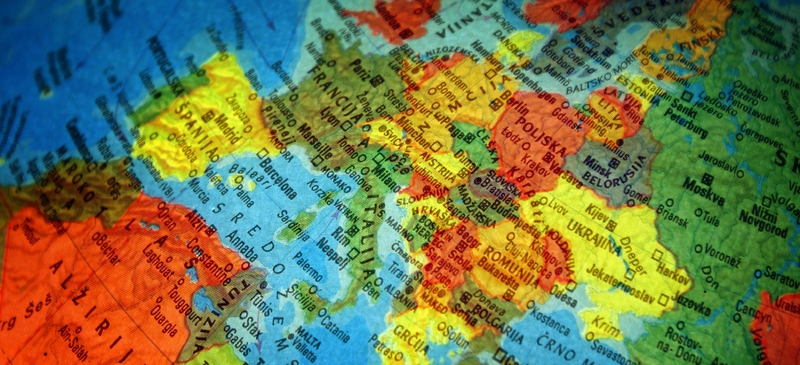
A bad European dream
On a grey Thursday morning in June 2006, Lee Barker, a 29-year-old Midlands businessman, was packing his bags to go to Germany. He would be one of the lucky few able to see England play in the football World Cup. The German government had banned English fans following a rampage through Vienna after a qualifying match against Austria. “A ban on our decent lads is an insult to our nation”, thundered Prime Minister Robert Kilroy-Silk on the Today Programme. Lee cared little. Since his mother was born in Cork, he had an Irish passport. Irish-German relations were still OK.
Lee was excited. He knew few people who had been to ‘Europe’. His dad was one of them, and he still raved about the food he had tasted when he travelled to Italy in 1984 to watch Liverpool play Roma in the European Cup final. He said the Italians had dozens of different noodle dishes, all called ‘pasta’. He also claimed that Italians drank wine with every meal. How could they? In Britain, only very posh people drank wine – the import duties made it far too expensive.
Lee’s girlfriend, Julie, was a little jealous. In her early twenties she had wanted to go abroad herself, to study in France. She had learnt French at university and was keen to see where her favourite French poets had lived and worked. But the idea turned out too costly and complicated, since Paris Universities charged big fees for visiting British students. And Julie’s home university refused to add the time abroad to her degree.
Lee thought about Julie’s disappointment when he sat on the bus to the British coast. Flying would have set him back £588 for an economy class ticket. British Airways still had a monopoly on domestic flights, and on flights abroad it fixed prices with the likes of Lufthansa or Swiss Air. The British government was thinking about introducing limited competition for air travel over the next 15 years, but feared that Air France, which received even larger subsidies, would simply undercut British Airways. The French government argued that state support was needed as long as the entire industry was in the grip of Boeing, sole supplier of larger passenger aircraft and parts. Smaller European producers had attempted to club together to compete with Boeing. But clashing laws, customs tariffs and economic nationalism had stood in the way. Now all the companies had gone bust.
So Lee took a boat to Zeebrugge in Belgium, and then another bus to Cologne. Along the way, he spent a couple of hours in Brussels, a city that occasionally came up in pub quizzes (“Which European capital city is part of a vegetable?”). He walked past shop windows full of delicious looking chocolates. But Lee hadn’t bothered to get any Belgian currency (what was it called again?). The exchange commission was exorbitant, so he had decided to buy only German marks.
The bus was stuck for almost five hours at the Belgian-German border, as the German border guards checked travel documents against their database. The driver said that a couple of dangerous criminals had escaped from a Belgian prison. Since there was no co-operation between the German and Belgian police authorities, the only option the Germans had was to tighten security on their borders.
Sitting on the bus, Lee got tired of his newspaper. The main headline read “Balkans on verge of war again”. The British, French and Germans were each supporting a different faction, and the US wasn’t interested in Balkan security. At least the novelty of the trip took Lee’s mind off his business worries. The British economy had been in a slump for almost two years, and his car parts business was doing badly. Lee had thought about exporting toGermany and France, where growth was apparently higher. But the German and French governments imposed massive tariffs on imported car parts, to protect their own ‘national champions’ in the automotive sector.
Lee wanted to be angry with the Germans for that, but when the bus finally rolled into Cologne city centre, he was pleasantly surprised. He took a stroll along leafy avenues and quiet squares, where people were sipping cold beer in street cafés. To his great relief, Lee found that the owner of his small hotel even spoke some broken English. He had worried a great deal about how he would get by without knowing any German (aside from a few useless words he had learned in history class).
The following day, England played France. Lee was excited, not because he was anti-French but because he wanted to see the stars of the French team, Thierry Henry and Patrick Vieira, live in action. English football was great but a little dull, with only a small handful of flamboyant players, such as David Beckham, and very few foreign players.
France won, but since there were so few Englishmen around to commiserate with, Lee found himself in a pub surrounded by French fans. One of them, Pierre from nearby Strasbourg, spoke English since his father had been an American GI. “Look on the bright side”, said Pierre, “at least we will do our best to stop the Germans from winning. Just like you would have done.” They raised their glasses to this, and agreed that it would be great if they could get the famous, Kölsch beer back home.
The television in the corner showed a programme about a maverick movement called the Europeanists. Both Lee and Pierre had heard of them, since some big-name national politicians had joined, including Joschka Fischer, Daniel Cohn-Bendit and Tony Blair. “You know, those crazy guys want us to open our borders, merge our economies and even have the same currency!” said Pierre. “Yeah, and they are talking about building a railway under the channel between France and Britain”, replied Lee. “Just crazy”, they both agreed, and they quaffed their delicious German beer.
